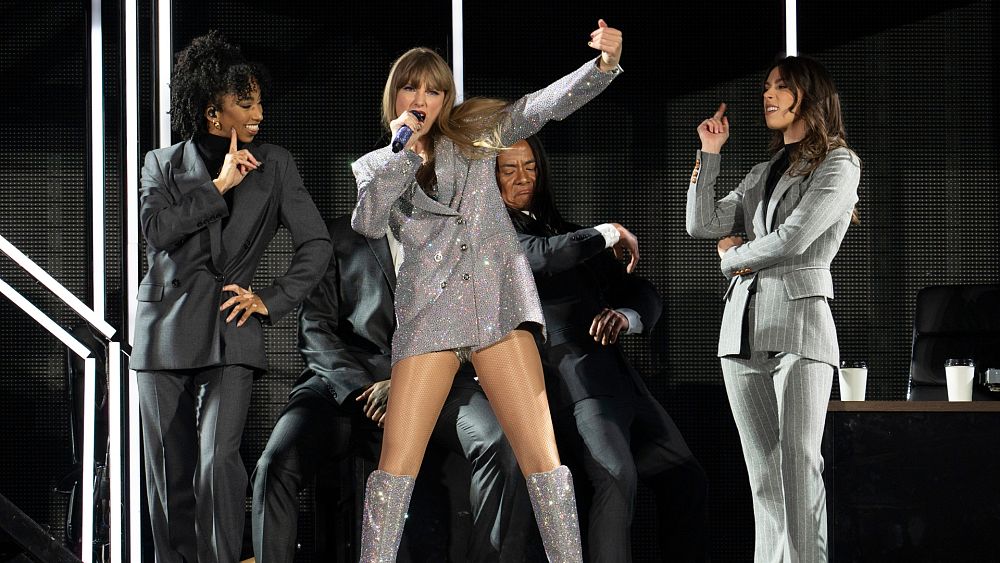
From ‘Beyflation’ to ‘Swiftonomics’: are a string of mammoth popstar tours this summer rocking the economy?
In recent years, concert tickets have surged in price. Even economists have noticed, nicknaming the phenomenon: “Funflation”.
From Taylor Swift’s ‘Eras’ to Beyoncé’s ‘Renaissance‘ and Bruce Springsteen’s self-titled tour, several of the world’s biggest names are putting on a show this summer for millions across the world, including Europe.
This has led certain analysts to ponder whether the exorbitant prices fans are willing to pay to see their favourites perform live — and the subsequent effect on accommodation costs — could be tangibly impacting the economy.
In Sweden, for instance, the Danske Bank predicted that Beyoncé — who opened her world tour in Stockholm this May — contributed to an upswing in hotel prices that left the monthly inflation rate 0.2 per cent higher than expected.
The UK has also observed a similar impact, as recreation and culture prices rose 6.8 per cent in the year to May 2023, the fastest in 30 years, with the largest effect from cultural services, especially admission fees to concerts and other live music events.
“People are willing to splurge because they know they will get quality content, plus who knows when or if she’ll do another tour after this one,” said London-based Beyoncé fan Mario Ihieme.
Just last weekend, 150,000 music fans paid €395 (£340) for a coveted ticket to Glastonbury festival to see Elton John, Lana del Rey, Lizzo and hundreds of other acts.
Event prices in UK inflation data are based on when shows take place, not when tickets are bought. But with different artists performing every month, it’s difficult to compare one to the other, an Office for National Statistics spokesperson said.
“The (subjective) quality of music artists emphasises how difficult it is to calculate a ‘clean’ price increase,” said UBS Global Wealth Management chief economist Paul Donovan. “And for UK inflation, the pressures may persist,” he added, noting a string of UK gigs by singer Harry Styles in June.
On reseller Stubhub, the cheapest seat for a July Taylor Swift show in Seattle is €1,097 ($1,200); tickets for an August Mexico City show cost €457 ($500) each.
“I had to get nine phone numbers for three different accounts on Ticketmaster under three different credit cards,” said Joel Barrios, a Beyoncé fan in Los Angeles. He spent about €6,401 ($7,000) on three US shows for himself and friends – as well as another €6,601 ($6,650) for several shows in Europe.
Others say they had an easier time. Carolina Candelas spent €92 ($101) each to see Beyoncé with her sisters and parents in Barcelona. “My sister purchased them in a presale link that Ticketmaster sent her, so I think it was really easy,” she said.
But with live music just a subset of overall entertainment costs, which account for a smaller part of consumer spending than housing or food, some doubt that concert prices could have a noticeable effect on inflation.
Andy Gensler, executive editor of Pollstar, a publication that tracks the global concert industry, called it a “ridiculous assertion” that Beyoncé’s shows would affect inflation. While ticket prices have increased, he said, mid-year figures haven’t shown an appreciable rise since May 2022, when US inflation was 8.6 per cent.
Others have even put forward the argument that the massive impact of this recent string of mammoth pop tours could be helping salvage the economy, especially as the arts and hospitality sectors suffered throughout the COVID-19 pandemic.
Indeed, the term “Swiftonomics” — a neologism to describe Taylor Swift’s purported economic footprint — is all the rage as the American singer-songwriter’s latest tour is expected to gross over €570-665 million ($624-728) in the US alone, and possibly over €1 billion internationally. Both Swift and Beyoncé’s tours have left certain commentators speculating about their potential recession-saving effects.
The US Labor Department does not specifically measure inflation for concert prices, but the inflation rate for live performing admission events is currently 2.6 percentage points more than US headline inflation. That gap has increased this year as headline figures have declined.
